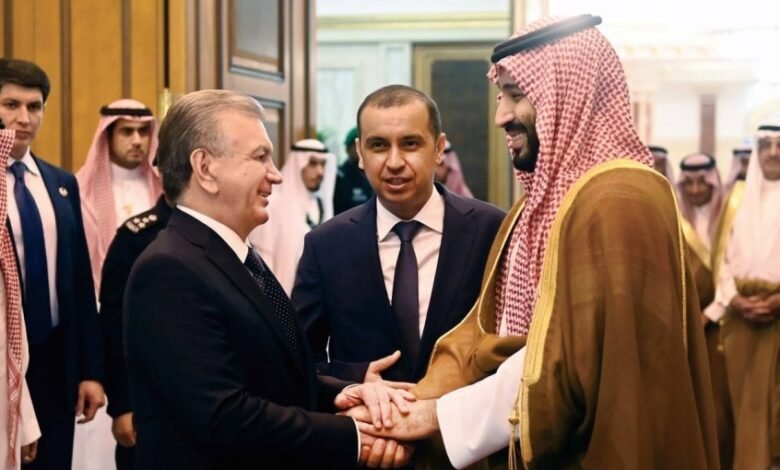bne IntelliNews – PANNIER: Gulf investment commitments to Central Asia rival sums once pledged by China

When Russia launched its war on Ukraine in late February 2022, many countries saw opportunities open up in Central Asia as Russian influence receded.
Disruptions to traditional Russian supply chains and to trade routes that run through Russia, as well as the sight of some one million Russians passing through Central Asia in 2022 en route to third countries to escape conscription or persecution for anti-war sentiment were cause for Central Asian governments to reassess their relationship with Russia and seek alternative partners.
The five Central Asian countries have thus welcomed the surge of interest in their region. Many countries that were on the margins of Central Asian foreign policy have become far more important since Russia’s march into Ukraine and that’s particularly the case with some Arab states.
Diplomatic ties
On April 15, the foreign ministers of Kazakhstan, Kyrgyzstan, Tajikistan, Turkmenistan, Uzbekistan, Bahrain, Kuwait, Oman, Qatar, Saudi Arabia and the United Arab Emirates were in Tashkent for the second Central Asia-Gulf Cooperation Council (GCC) Joint Ministerial Meeting on Strategic Dialogue. The first such meeting of foreign ministers from the 11 countries was in Riyadh in September 2022.
“Family photo” from the first Central Asia-GCC summit (Credit: Gulf International Forum).
The first Central Asia-GCC summit was held in Jeddah in July 2023, and a second summit is planned for Samarkand, Uzbekistan, in 2025.
These are the most visible manifestations of rapidly strengthening ties between Central Asia and the Gulf that in many cases involve enormous commitments of Arab investment capital.
The three Arab states that are playing leading roles in this new relationship with Central Asia are Saudi Arabia, the UAE and Qatar.
The presidents of the Central Asian countries have all visited Saudi Arabia individually since February 2022, while they gathered together in the country for the July 2023 summit. Some of the presidents have also journeyed to Saudi Arabia for other international conferences in the past two years. Central Asian leader visits to the UAE and Qatar have also taken place.
Qatari Emir Sheikh Tamim bin Hamad Al Thani, meanwhile, visited Uzbekistan, Kyrgyzstan and Tajikistan in early June 2023. It was the first time a Qatari emir had ever visited Uzbekistan and Kyrgyzstan. Al Thani’s trip to Tajikistan was timed with the opening of a new $100mn mosque in Dushanbe. Qatar provided some $70 mn of the funds for the place of worship.
Qatar covered most of the cost of Dushanbe’s largest mosque, opened in June last year (Credit: Presidency of Tajikistan).
Last December, Uzbekistan finally opened an embassy in Qatar.
Also in the last two years, business delegations from all the Central Asian states have been in Saudi Arabia, Qatar and the UAE frequently and business delegations from the trio of Arab states have made regular trips to Central Asia.
ACWA and Masdar
Saudi company ACWA and UAE company Masdar were already engaged in renewable energy projects in Uzbekistan before Russia launched its Ukraine invasion.
Promotional video on Masdar clean energy investment commitments in Uzbekistan (Credit: Masdar.ae).
These projects included Masdar’s construction of a 100-MW solar power plant that started operations in Uzbekistan’s Navoi Province in 2021 and work on a 500-MW wind farm in Navoi Province. In Uzbekistan, Masdar also has two 220-MW photovoltaic (PV) solar plants, one in Jizzakh Province and the other in Samarkand Province, and a 457-MW photovoltaic station in Surhandarya Province.
ACWA signed deals with Uzbekistan in 2020 for projects worth more than $2bn, including the construction of a 1.5-gigawatt (GW) combined cycle gas-turbine power plant, and wind power plants, or wind farms, to generate 500-100 MW.
When Uzbek President Shavkat Mirziyoyev visited Saudi Arabia in August 2022 (it was the first state visit of an Uzbek president to Saudi Arabia in 30 years), agreements worth some $13.1bn were signed, including preliminary deals for ACWA to build a 1.5-GW wind farm in Uzbekistan’s western Karakalpakstan Republic and help develop green hydrogen in Uzbekistan.
In May 2023, ACWA announced additional wind and green hydrogen projects in Uzbekistan, bringing the Saudi company’s investment total in Uzbekistan to some $4.1bn. That also makes Uzbekistan, Central Asia’s second largest economy after Kazakhstan, ACWA’s second largest market after Saudi Arabia.
ACWA started talks with Kazakhstan on the construction of a 1-GW wind farm in Kazakhstan’s eastern Zhetysu Province in June 2023. The agreement was finalised during a visit of Saudi Energy Minister Abdulaziz bin Salman Al Saud and ACWA chairman Mohammad Abdullah Abunayyan to Kazakhstan in early March this year.
In December 2023, Masdar signed a $2.6bn deal with Uzbekistan to build a 2-GW wind farm and energy storage facility. In March , Uzbek President Mirziyoyev signed off on a deal for Masdar to build a 300-MW solar power plant with a 75-MW storage system in Kashkadarya Province.
Also in March, Uzbek state hydropower company Uzbekgidroenergo signed an agreement with Masdar for a study of pumped storage hydropower plant (HPP) use in Uzbekistan.
At the start of this year, Masdar announced it had invested some US $4bn in Uzbekistan.
The UAE company signed a joint development agreement with Kazakhstan in December 2023 to develop 1-GW of wind power in Kazakhstan.
Masdar marked its “first entry into Turkmenistan” in November 2022 with a deal to build a 100-MW PV plant. That was followed by Masdar’s entry into Kyrgyzstan in January 2023, with an agreement for a 200-MW PV plant, which could include use of floating solar, and its arrival in Tajikistan in October 2023 with a deal to explore at least 500 MW of clean energy project capacity, including floating solar power and hydropower.
Not only renewables
Saudi Arabia and Qatar have also become involved in other projects in Central Asia since 2022.
In February 2023, the Saudi-based Islamic Development Bank (IDB) announced it would provide $150mn towards the construction of Tajikistan’s massive Rogun HPP, a multibillion-dollar project to generate some 3.6 GW. The Tajik government has been touting the mega project for some 20 years as the country’s key to energy independence.
The IDB later pledged an additional $100mn in funding for Rogun.
Two months ago, the first ever visit by a Kazkah president to Qatar was paid by Kassym Jomart-Tokayev, second from left (Credit: social media, Amiri Diwan).
In mid-February, Kassym-Jomart Tokayev paid the first ever visit by a Kazakh president to Qatar. During that trip, Qatari company UCC Holding signed a deal with QazaqGaz to build a gas-processing plant to handle gas from Kazakhstan’s offshore Caspian Kashagan gas and oil field.
Another agreement provided for Qatari investment in construction of the second line of the Beyneu-Bozoi-Shymkent and the Aktobe-Kostanay gas pipelines.
Kazakh Prime Minister Olzhas Bektenov journeyed to Qatar on March 20 to seek additional Qatari investment. In total, Kazakhstan and Qatar agreed on investment in projects worth some $17.6bn that included $5.7bn for the Aktobe-Kostanay gas pipeline and $7.7bn for the second strand of the Beyneu-Bozoi-Shymkent pipeline.
On February 20, railway and transportation officials from Afghanistan, Uzbekistan and Qatar signed an agreement for a technical and economic feasibility study for the proposed trans-Afghan railway, connecting Uzbekistan, Afghanistan and Pakistan. The 600-kilometre (373-mile) railway, with an estimated cost ranging between $5bn and $8bn, would connect Uzbekistan, and more broadly Central Asia and even European countries, with Pakistani ports on the Arabian Sea, greatly enhancing north-south trade in the region.
The ambitious plan has been frequently discussed in the last six years, but since the Taliban returned to power in Afghanistan in August 2021, foreign financial backers have not shown much interest in the project. Gulf capital could make a difference.
Uzbek President Mirziyoyev met with the Qatari foreign minister on the sidelines of the GCC-Central Asia meeting in Tashkent to discuss the railway and Qatar’s participation in realising the project.
The UAE’s Dragon Oil is expanding its activities in Turkemenistan (Credit: dragonoil.com, promotional video, screenshot).
Looking at Turkmenistan, UAE company Dragon Oil has been working there for some 25 years developing several Caspian Sea oil and gas fields. Last December, Dragon Oil announced it had opened its “largest regional office” in Ashgabat and would be “bolstering its investments” in Turkmenistan to expand oil output and “projects related to renewable energies.”
Key connectivity
The GCC countries are also looking for better key connectivity with Central Asia, and via Central Asia to Russia and China.
Abu Dhabi’s AD Ports Group is leading the way in opening routes between Central Asia and the Gulf.
Kazakh Trade and Integration Minister Serik Zhumangarin met with Davud Tafti, head of AD Ports Group’s subsidiary Simatech Shipping & Forwarding, last August. The two discussed “the shortest direct route for Kazakh exports to the markets of the coast of East Africa, India, the Middle East, Pakistan, and the Persian Gulf.”
The discussed route passes through Iran, running from its Caspian Sea port of Amirabad to its Persian Gulf port of Bandar Abbas. It would “allow Kazakh exporters to deliver goods in three days” from the Kazakh Caspian Sea port at Kuryk to the Persian Gulf, from where they would be forwarded to the UAE ports of Khalifa and Fujairah.
In December, AD Ports Group formed a joint venture with Kazakhstan Temir Zholy, Kazakhstan’s national railway company, “to enhance rail connectivity, maritime shipping services, and development of operations in Kazakhstan’s ports, [and] accelerate digital transformation and connectivity in Central Asia.”
AD Ports Group and Kazakh state oil and gas company KazMunayGaz in January announced plans to construct a shipbuilding and ship repair yard in Kazakhstan.
Potential in food import
Food from Central Asia appears to be one of the key imports the Arab states are seeking from the region.
The Kuwait Investment Fund stated last November that it would invest up to $2bn in projects in Kazakhstan, including a grain processing venture.
When Kazakh President Tokayev visited Doha in February, besides the gas-processing and gas pipeline investments, agreements were also signed for Qatar to invest $200mn in a grain and peas processing plant and $300mn in a milk, dairy and meat production complex in Kazakhstan.
Later in February, Uzbekistan’s ambassador to Oman met with the head of Omani state company Flour Mills SAOG as well as the president of Atyab Investments, Haysam al-Fanna. Al-Fanna noted that Atyab had invested $2mn in establishing a Tashkent region laboratory and training centre for the international certification of Uzbek food product exports. Al-Fanna also mentioned that another $4mn was allocated for a fruit and vegetable canning plant and food packaging equipment.
AD Ports Group’s work involving Kazakhstan’s rail and port connections to establish a route from Central Asia to the Persian Gulf could make the region a significant food supplier the GCC countries.
Figures speak for themselves
Figures such as the $17.6bn in the Qatari-Kazakh investment plan or the $13.1bn in deals signed during Uzbek President Mirziyoyev’s August 2022 visit to Saudi Arabia rival the sums China once pledged to Central Asia.
Diplomatic, business and trade relations between the Central Asia and Gulf regions are rapidly strengthening and there is the common bond of Islam to further link them.
For more than two years now, Arab states have been energetically boosting their ties with Central Asia. The momentum already built indicates that the GCC-Central Asian relationship is likely to continue expanding in the coming years.





